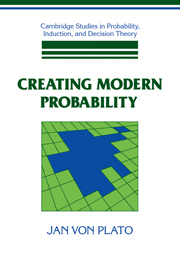Book contents
- Frontmatter
- Contents
- Preface
- 1 Introduction
- 2 Pathways to modern probability
- 3 Probability in statistical physics
- 4 Quantum mechanical probability and indeterminism
- 5 Classical embeddings of probability and chance
- 6 Von Mises' frequentist probabilities
- 7 Kolmogorov's measure theoretic probabilities
- 8 De Finetti's subjective probabilities
- Supplement: Nicole Oresme and the ergodicity of rotations
- Bibliography
- Index of Names
- Index of Subjects
5 - Classical embeddings of probability and chance
Published online by Cambridge University Press: 05 June 2012
- Frontmatter
- Contents
- Preface
- 1 Introduction
- 2 Pathways to modern probability
- 3 Probability in statistical physics
- 4 Quantum mechanical probability and indeterminism
- 5 Classical embeddings of probability and chance
- 6 Von Mises' frequentist probabilities
- 7 Kolmogorov's measure theoretic probabilities
- 8 De Finetti's subjective probabilities
- Supplement: Nicole Oresme and the ergodicity of rotations
- Bibliography
- Index of Names
- Index of Subjects
Summary
SUBJECTIVE OR OBJECTIVE PROBABILITY: A PHILOSOPHICAL DEBATE
In the mechanical world view of last century's physics, the future course of events was thought determined from the present according to the mechanical principles governing all change. If there was any ignorance, it was completely located in the ignorant person's mind. It follows that probability stands only as a kind of index of the degree of ignorance. Laplace is, more than anyone else, responsible for this classical concept of probability. It can be found in his Essai philosophique sur les probabilités, written as a popular preface to the second (1814) edition of his extensive Théorie analytique des probabilités. There, in the classic passage on Laplacian determinism, we find him imagining ‘an intelligence which could comprehend all the forces by which nature is animated…for it, nothing would be uncertain and the future, as the past, would be present to its eyes’ (p. 4). The exactness of planetary motions was of course the practical reason for such confidence in determinism. But Laplace made a giant extrapolation from astronomy to the smallest parts of nature: ‘The curve described by a simple molecule of air or vapor is regulated in a manner just as certain as the planetary orbits; the only difference between them is that which comes from our ignorance’ (p. 6). In a deterministic universe there are no true probabilities, for complete knowledge would make all probabilities be 0 or 1.
- Type
- Chapter
- Information
- Creating Modern ProbabilityIts Mathematics, Physics and Philosophy in Historical Perspective, pp. 164 - 178Publisher: Cambridge University PressPrint publication year: 1994



